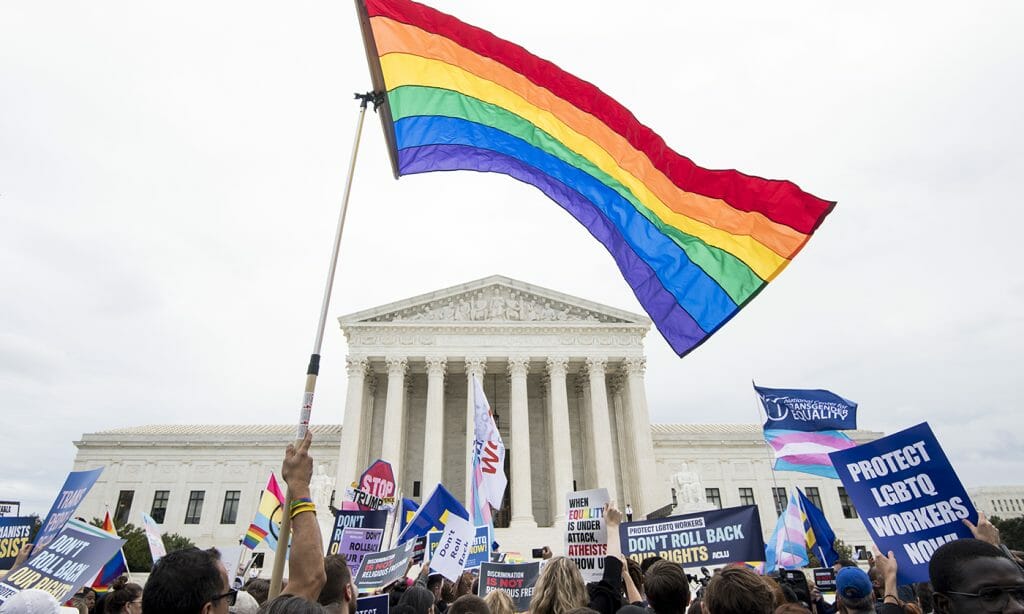Originally posted: November 11, 2024
The U.S. Supreme Court is scheduled to hear oral argument on Dec. 4 in a landmark case regarding a Tennessee law banning health care for transgender youth.
The case, U.S. v. Skrmetti, challenges Tennessee’s law banning health care such as hormone therapy and puberty-pausing medications for transgender youth under 18, while the same treatments remain available to non-transgender youth. The law also criminalizes doctors and providers who seek to support transgender youth seeking care. As the ban is one of approximately 25 such bans passed in Republican-controlled legislatures around the country in recent years, the Court’s decision could have widespread impact on the availability of care to all youth nationwide.
Tennessee’s ban forced transgender youth who were previously receiving treatment to end that care. Transgender teenagers in the state may now be forced to detransition and/or undergo the onset of unwanted physical effects of puberty that may be difficult to later reverse.
The plaintiffs in the case include Samantha and Brian Williams of Nashville, Tennessee and their 16-year-old transgender daughter, two anonymous other families, and Memphis-based medical doctor Dr. Susan Lacy. An openly transgender attorney will present to the justices for the first time in Court history: Chase Strangio, co-director of the American Civil Liberties Union’s LGBTQ & HIV Project.
More than 30 friend-of-the-court briefs in support of the plaintiffs were submitted by 20 states; the American Bar Association, NAACP Legal Defense Fund, National Women’s Law Center and other legal scholars and groups; the American Academy of Pediatrics and other national and state medical and mental health associations; national and state LGBTQ and civil rights organizations; clinicians, researchers, and experts with nearly 90 years’ collective experience in treating more than 4800 transgender youth; transgender people sharing their personal stories; 164 members of Congress; and more than 30 Republican elected officials and conservative leaders. Opposition briefs have been filed by longtime opponents of LGBTQ people and equality, including Alliance Defending Freedom, American Family Association, American College of Pediatrics, and American Principles Project. Tennessee’s attorney general argued that the Supreme Court should expand on its ruling overturning Roe v. Wade in order to remove decisionmaking from transgender people about their health care.
FAST FACTS
- Health care for transgender youth, including access to hormone therapy and puberty blockers, is supported by every major medical association and leading world health authority as best practice and medically necessary health care. Statements here.
- The Court will specifically address whether transgender youth can be banned from accessing hormone therapy, puberty blockers, and similar prescribed medications. The case does not address surgery for transgender youth, which is already rarely performed. A recent Journal of the American Medical Association report showed 3,600 procedures for transgender patients ages 12 to 18 over the last seven years; by contrast, 229,000 U.S. teens had surgical procedures to affirm their cisgender identities in a single year, 2017, including breast reductions for boys, or breast augmentation for girls.
- The Court will only hear the challenge about the constitutionality of Tennessee’s transgender health care ban under the Equal Rights Protection clause of the U.S. Constitution. It did not take up the portion of the case that argues it is the Due Process right of parents to make health care decisions alongside their children without government interference, although that question remains as the litigation continues in the lower courts.
- Tennessee is estimated to be home to over 3,000 transgender youth and approximately 28,000 transgender adults.
- The ban on health care for transgender youth in Tennessee passed in March 2023. The lawsuit was filed the following month by the American Civil Liberties Union, the ACLU of Tennessee, Lambda Legal, and Akin Gump Strauss Hauer & Feld LLP. The Supreme Court announced in June 2024 that it will take up the case.
BEST PRACTICES FOR REPORTERS
- Include LGBTQ voices in stories about LGBTQ people. Seek transgender interviewees in stories about transgender people.
- Elevate expertise over opinion – find experts in healthcare, sports, education, human rights who can credibly and with experience in LGBTQ issues speak to the issues discussed.
- Challenge and plainly state when rhetoric or bill language is false, and or without evidence.
- Center and prioritize the lived experience of an LGBTQ person rather than the opinion of a non-LGBTQ person about LGBTQ people.
- Avoid “both sides” coverage. Facts and lived experiences do not need a counter-side. There is consensus among the experts, the data, the science and facts about the safety and effectiveness of the care. All health care comes with nuanced, individual, private decisions weighing risks, benefits and access.
- Check and report anti-LGBTQ history. Lawmakers proposing bans on health care for transgender youth frequently have a history of anti-LGBTQ policy and rhetoric, and associations with anti-LGBTQ groups. Groups and individual profiles are documented on the GLAAD Accountability Project. Jonathan Skrmetti, Tennessee’s Attorney General defending the ban on transgender health care, has led a coalition of 17 states in fighting a proposed federal rule intended to give LGBTQ youth greater protections in foster care.
RESOURCES
U.S. v. Skrmetti – American Civil Liberties Union case page
Tennessee Equality Project, the state’s leading LGBTQ advocacy organization













